Article Abstract
Cognitive biases, like overconfidence, just-world hypothesis, and hostile attribution, make individuals susceptible to scams and fraud.
These biases, mental shortcuts based on past experiences, lead to judgments not grounded in evidence or reasoning. Confirmation bias, a major factor, makes people vulnerable by reinforcing preexisting beliefs. To protect against deception, awareness of these biases is crucial. Skepticism, careful evaluation, seeking diverse perspectives, and consulting trusted sources can reduce vulnerability. Overconfidence bias, wherein individuals overestimate their abilities, and just-world hypothesis, assuming the world is inherently fair, contribute to victim blaming. Hostile attribution bias misinterprets neutral behavior as intentionally negative, fostering conflict. Addressing these biases is vital for mental well-being and avoiding scams.
More Cognitive Biases
This article is part of SCARS continuing commitment to helping the victims of scams (financial fraud) to better understand the psychology of scams. In other words, why are victims vulnerable?
Cognitive Biases Discussed In This Article:
- Overconfidence Cognitive Bias
- Just-World Hypothesis Cognitive Bias
- The Hostile Attribution Cognitive Bias
How Do Cognitive Biases Make People Vulnerable To Scams, Fraud, and Deception
How do cognitive biases play a role in making people vulnerable and susceptible to scams, fraud, and deception?
Cognitive biases are mental shortcuts that allow people to make quick decisions and judgments based on their past experiences and memories. These biases can be helpful in many situations, as they allow people to process large amounts of information quickly and efficiently. However, they can also make people vulnerable to scams, fraud, and deception.
One reason why cognitive biases make people vulnerable to scams is that they can lead people to make judgments that are not based on evidence or logical reasoning. For example, Confirmation Bias (a major bias that makes people vulnerable) is the tendency to seek out and interpret information that supports one’s preexisting beliefs, while ignoring or dismissing information that contradicts them. This can make people more susceptible to scams that appeal to their beliefs or biases, as they are more likely to believe the scammer’s claims without critically evaluating the evidence.
There are several ways that people can protect themselves from scams, fraud, and deception. One way is to be aware of common cognitive biases and how they can affect decision-making. This can help people to be more mindful of their thought processes and to question their own judgments.
Another way to protect oneself is to be skeptical of claims and offers that seem too good to be true. It is important to carefully evaluate the evidence and to ask questions before making a decision. This can help people to avoid falling for scams that rely on emotional appeals or incomplete information.
It can also be helpful to seek out additional sources of information and to consult with trusted friends, family members, or professionals before making a decision. This can provide a more balanced perspective and help to identify any potential red flags.
Overall, cognitive biases can make people vulnerable to scams, fraud, and deception by leading them to make judgments that are not based on evidence or logical reasoning, and by causing them to make irrational or risky decisions. However, by being aware of these biases and taking steps to protect oneself, people can reduce their risk of falling victim to these types of scams.
Overconfidence Cognitive Bias
Overconfidence bias is a cognitive bias in which individuals overestimate their own abilities, knowledge, or performance in a particular area. This bias can lead individuals to have an inflated sense of their own skills, which can result in poor decision-making or overestimation of one’s own potential for success.
Overconfidence bias can be caused by a variety of factors, such as a lack of self-awareness, cognitive dissonance, and the influence of external factors such as culture and environment. It can also result from past successes or an over-reliance on intuition and gut feelings, rather than objective evidence.
The consequences of overconfidence bias can be significant, particularly in high-stakes situations such as investing, entrepreneurship, or leadership. For example, an overconfident entrepreneur may underestimate the risks associated with a new venture, leading to financial losses or business failure. An overconfident leader may make decisions that are not supported by the data or fail to take into account the perspectives of others, which can lead to poor organizational performance or low morale.
To mitigate the effects of overconfidence bias, individuals can take steps such as seeking out feedback from others, remaining open to alternative perspectives, and relying on objective data and evidence to inform decision-making. It is also important to develop self-awareness and recognize when one’s own biases may be influencing their judgments or actions.
The “I know better than you do” cognitive bias, also known as the “overconfidence bias,” is a tendency for individuals to overestimate their own knowledge, abilities, or expertise and to underestimate the knowledge, abilities, or expertise of others. This bias can lead individuals to believe that they are always right, even in situations where they lack relevant knowledge or experience.
The overconfidence bias can arise from a variety of factors, including a lack of self-awareness, a desire to prove oneself or gain recognition, and the influence of social or cultural norms that prioritize individualism or risk-taking over collaboration or deference to authority.
Individuals who exhibit this bias may be more likely to engage in behaviors that are not aligned with their actual abilities or to take unnecessary risks that could lead to negative outcomes. They may also be less likely to seek out feedback or advice from others, as they may believe that they already know the best course of action.
The overconfidence bias can have significant consequences in a variety of contexts, including decision-making, leadership, and interpersonal relationships. To mitigate the impact of this bias, individuals should strive to develop self-awareness, seek out diverse perspectives and expertise, and remain open to feedback and constructive criticism. Additionally, organizations and teams can foster a culture of collaboration and respect that encourages individuals to recognize and leverage each other’s strengths and expertise.
What is the difference between overconfidence bias and messiah or savior syndrome?
Overconfidence bias and messiah or savior syndrome are related, but distinct psychological phenomena.
Overconfidence bias refers to the tendency for individuals to overestimate their own abilities, knowledge, or performance in a particular area. This bias can lead individuals to have an inflated sense of their own skills, which can result in poor decision-making or overestimation of one’s own potential for success.
Messiah or savior syndrome, on the other hand, refers to the belief held by some individuals that they have a special mission, destiny, or calling to save or fix a particular group, organization, or society. This syndrome can lead individuals to become overly invested in their own vision or agenda, to the point where they may be unwilling to consider alternative perspectives or feedback.
While overconfidence bias and messiah or savior syndrome share some similarities, they are distinct psychological phenomena. Overconfidence bias is more focused on an individual’s assessment of their own abilities or performance, whereas messiah or savior syndrome is more focused on an individual’s sense of purpose or calling.
Both overconfidence bias and messiah or savior syndrome can lead individuals to make poor decisions or engage in behaviors that are not aligned with their actual abilities or the needs of the organization or society. It is important for individuals to recognize these biases and work to mitigate their effects through self-awareness, seeking out diverse perspectives, and remaining open to feedback and constructive criticism.
Just-World Hypothesis Cognitive Bias
The Just-World Hypothesis is a cognitive bias that refers to the tendency of people to believe that the world is fundamentally just and that people get what they deserve.
This bias is based on the idea that good things happen to good people, and bad things happen to bad people.
Of course, we know this is without merit and invalid, but this bias plays a large role in helping scam victims blame themselves.
Research suggested that people have a strong desire to believe that the world is just and that good things happen to good people. This desire is so strong that people will often go to great lengths to justify why bad things happen to other people, even if the explanations are not logically sound.
One way in which the Just-World Hypothesis manifests itself is through victim blaming. When bad things happen to people, such as getting sick, losing their job, or being the victim of a crime, people often try to find a reason why it happened. One way they do this is by blaming the victim, even if there is no evidence to suggest that the victim did anything to cause the event.
For example, a person who is sexually assaulted may be blamed for dressing provocatively, going out late at night, or drinking too much. Similarly, a person who is diagnosed with a serious illness may be blamed for not living a healthy lifestyle, even if there is no evidence to suggest that their lifestyle choices played a role in their illness.
Another example is scam victims, they would not have been scammed if they were not online, foolish, trusting strangers, etc. etc.
Victim blaming is a way for people to maintain their belief in the just world. By blaming the victim, they are able to convince themselves that bad things only happen to people who deserve it. This belief allows them to distance themselves from the event and feel less vulnerable to similar events happening to them.
Another way in which the Just-World Hypothesis manifests itself is through the belief in a meritocracy. A meritocracy is a system in which people are rewarded based on their merits, such as their abilities, talents, or hard work. People who believe in the just world often believe that the world operates as a meritocracy and that people who work hard and are talented will be rewarded with success and happiness.
However, this belief ignores the role that factors such as privilege, luck, and systemic inequalities can play in determining people’s outcomes. For example, a person who is born into a wealthy family may have more opportunities and resources available to them than someone who is born into poverty, regardless of their individual abilities or efforts.
However, the same applies to scam victims. Believers in a just world cannot easily accept that scam victims are not fundamentally to blame, even if they are the victim.
The belief in a just world can also lead to a lack of empathy for people who are less fortunate. People who believe that the world is just may view poverty, homelessness, or other social problems as the result of individual failings rather than systemic issues. They may see people who are struggling as lazy, unmotivated, or undeserving of help, rather than recognizing the complex social and economic factors that contribute to these problems.
The Just-World Hypothesis can also have negative consequences for people who are the victims of injustice. People who believe in the just world may be less likely to speak out against injustices, as they may believe that the victim somehow deserved what happened to them. This can create a culture of silence and acceptance around issues such as discrimination, harassment, and violence.
The Just-World Hypothesis is a complex cognitive bias that can have far-reaching implications for individuals and society as a whole. While it is natural for people to want to believe in a just world, it is important to recognize the limitations of this belief and to work towards creating a more equitable and just society for all people, regardless of their circumstances or background.
The Hostile Attribution Cognitive Bias
The Hostile Attribution Cognitive Bias refers to the tendency of people to interpret ambiguous or neutral behavior from others as intentionally hostile or negative.
This cognitive bias can manifest itself in various ways, such as interpreting a sarcastic comment as a personal attack or assuming that someone who disagrees with you is deliberately trying to upset you.
This is very often a trauma response that is triggered not by what the person actually said or did, but by the emotional triggers that remain from past traumas.
This is something that all scam victims, especially, have to be on guard for.
This cognitive bias can lead to a range of negative emotions and behaviors, such as anger, resentment, and conflict. It can also contribute to the breakdown of relationships and the creation of hostile and confrontational environments in workplaces, schools, and other settings.
The Hostile Attribution Cognitive Bias is believed to have evolutionary roots, though this is not its sole cause. In prehistoric times, humans faced constant threats from predators and other hostile individuals, and it was essential to be able to quickly recognize and respond to potential threats. As a result, the brain developed a bias toward interpreting ambiguous or neutral behavior as hostile, in order to prioritize self-protection.
This is quite ironic because another cognitive bias that is the polar opposite is Stranger Trust! That is where we trust strangers far more than is justified.
While this cognitive bias may have been useful in the past, it can be problematic in modern society. The Hostile Attribution Cognitive Bias can lead to misunderstandings and miscommunications, as people may interpret neutral or ambiguous behavior as intentionally hostile or negative. This can create unnecessary conflict and tension in relationships, as well as damage the trust and rapport between people.
One way in which the Hostile Attribution Cognitive Bias manifests itself is in the interpretation of nonverbal cues. For example, someone who is looking away or not making eye contact may be interpreted as being disinterested, deceptive, or hostile, when in reality they may be shy or nervous, or thinking of something at the same time. Similarly, a person who speaks in a monotone or quiet voice may be interpreted as being angry or upset, when in reality they may simply be tired or unwell.
Another way in which the Hostile Attribution Cognitive Bias can manifest itself is in the interpretation of written communication. For example, a brief or curt email may be interpreted as being intentionally rude or dismissive, when in reality the sender may simply be busy or preoccupied. Similarly, a sarcastic or humorous comment may be interpreted as being intentionally hurtful or critical, when in reality the sender may have intended it as a harmless joke (as long as it is not a culturally insensitive or demeaning joke.)
The Hostile Attribution Cognitive Bias can also contribute to the development of stereotypes and prejudices. When people are exposed to negative or hostile behavior from members of a particular group, they may begin to associate that behavior with the entire group. This can lead to the development of stereotypes and prejudices, which can in turn lead to further misunderstandings and conflicts.
To overcome the Hostile Attribution Cognitive Bias, it is important to be aware of its existence and to consciously challenge negative interpretations of ambiguous or neutral behavior. This can involve taking a step back and considering alternative explanations for the behavior, such as shyness, tiredness, or distraction. It can also involve actively seeking out positive interpretations of behavior, such as assuming that someone who disagrees with you is simply expressing their opinion, rather than trying to upset you.
However, it is important not to blindly dismiss hostile or inappropriate behavior, as most scam victims know only too well.
Another way to overcome the Hostile Attribution Cognitive Bias is to practice empathy and perspective-taking. This involves trying to understand the other person’s perspective and motivations, rather than assuming the worst about their behavior. By practicing empathy and perspective-taking, it is possible to create a more positive and productive environment in which misunderstandings are less likely to occur.
Being mindful and looking hard at your own reaction is a good way to determine if your own reaction was the result of a trigger, a bias, or a bad day can be very important.
In the final analysis, the Hostile Attribution Cognitive Bias is a cognitive bias that can lead to misunderstandings, conflicts, and the breakdown of relationships. By becoming aware of this bias and actively challenging negative interpretations of behavior, it is possible to create a more positive and productive environment in which people can communicate effectively and build positive relationships based on trust and mutual understanding.
Summary
Cognitive biases do make people more vulnerable to scams, fraud, and deception by causing them to ignore warning signs, pay more attention to information that supports their preexisting beliefs, rely on incomplete information, and anchor their decisions to easy and often incorrect information.
By being aware of these biases and making an effort to overcome them, people can be better equipped to avoid falling victim to scams and other forms of deception.
Important Information for New Scam Victims
- Please visit www.ScamVictimsSupport.org – a SCARS Website for New Scam Victims & Sextortion Victims
- Enroll in FREE SCARS Scam Survivor’s School now at www.SCARSeducation.org
- Please visit www.ScamPsychology.org – to more fully understand the psychological concepts involved in scams and scam victim recovery
If you are looking for local trauma counselors please visit counseling.AgainstScams.org or join SCARS for our counseling/therapy benefit: membership.AgainstScams.org
If you need to speak with someone now, you can dial 988 or find phone numbers for crisis hotlines all around the world here: www.opencounseling.com/suicide-hotlines
-/ 30 /-
What do you think about this?
Please share your thoughts in a comment below!
Do You Need Support?
Get It Now!
SCARS provides the leading Support & Recovery program for relationship scam victims – completely FREE!
Our managed peer support groups allow victims to talk to other survivors and recover in the most experienced environment possible, for as long as they need. Recovery takes as long as it takes – we put no limits on our support!
SCARS is the most trusted support & education provider in the world. Our team is certified in trauma-informed care, grief counseling, and so much more!
To apply to join our groups visit support.AgainstScams.org
We also offer separate support groups for family & friends too.
Become a
SCARS STAR™ Member
SCARS offers memberships in our STAR program, which includes many benefits for a very low annual membership fee!
SCARS STAR Membership benefits include:
- FREE Counseling or Therapy Benefit from our partner BetterHelp.com
- Exclusive members-only content & publications
- Discounts on SCARS Self-Help Books Save
- And more!
To learn more about the SCARS STAR Membership visit membership.AgainstScams.org
To become a SCARS STAR Member right now visit join.AgainstScams.org
To Learn More Also Look At Our Article Catalogs
Scam & Crime Types
More SCARS
- ScamsNOW Magazine – ScamsNOW.com
- ContraEstafas.org
- ScammerPhotos.com
- AnyScam.com – reporting
- AgainstScams.org – SCARS Corporate Website
- SCARS YouTube Video Channel


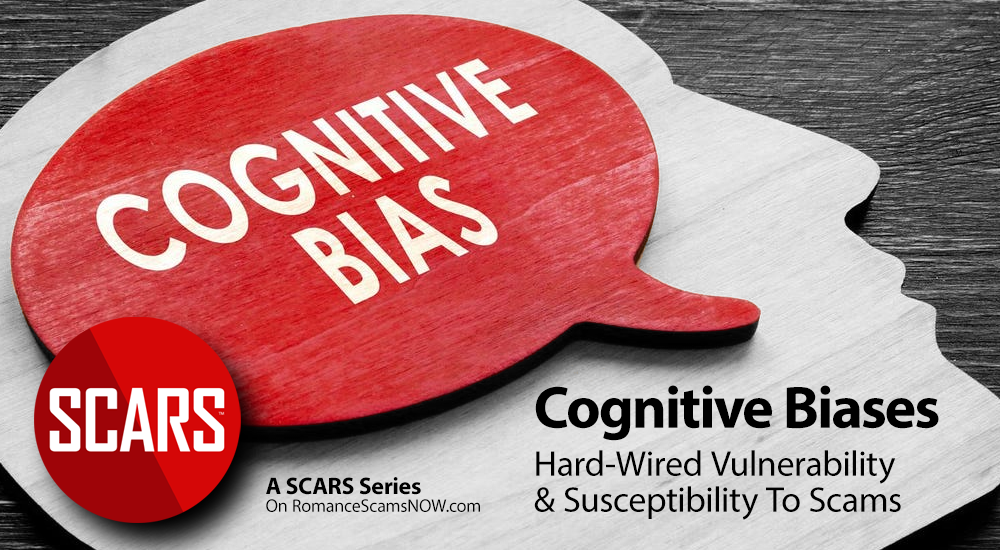
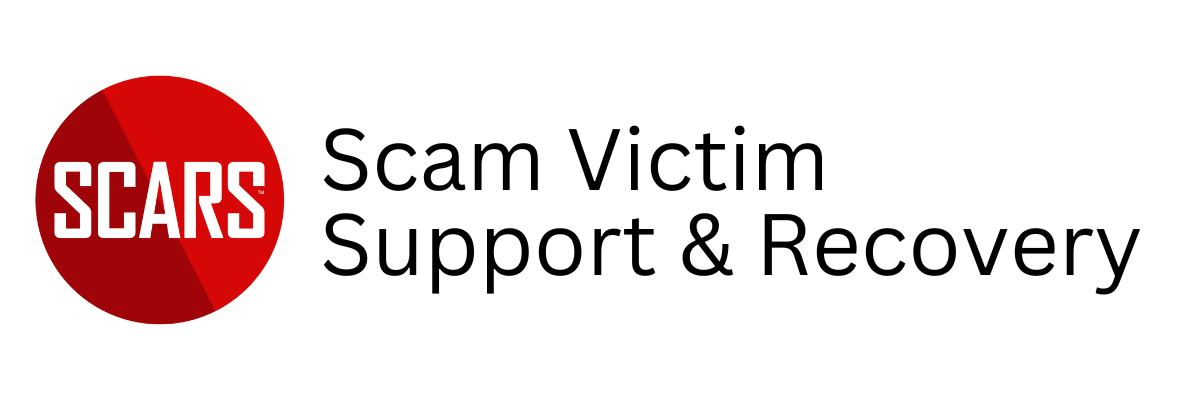

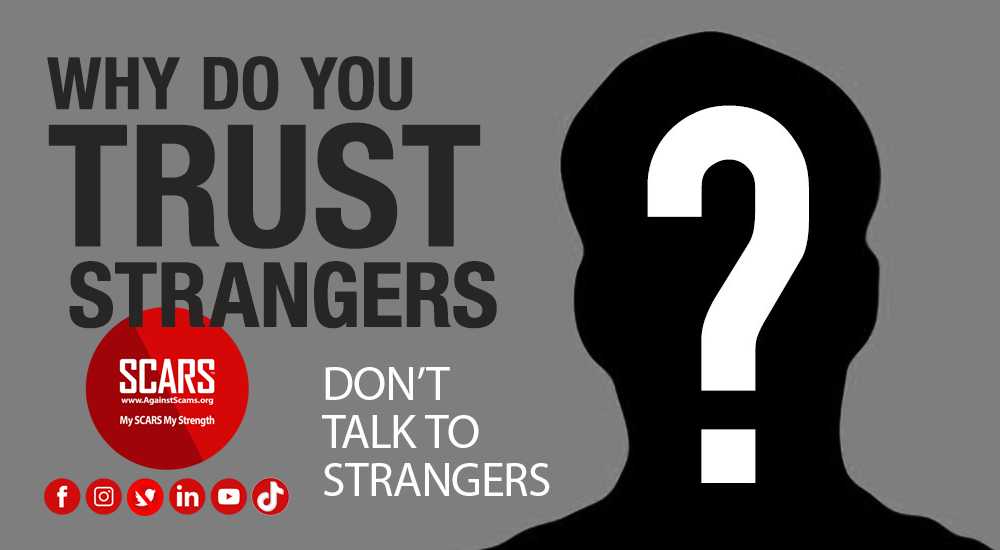
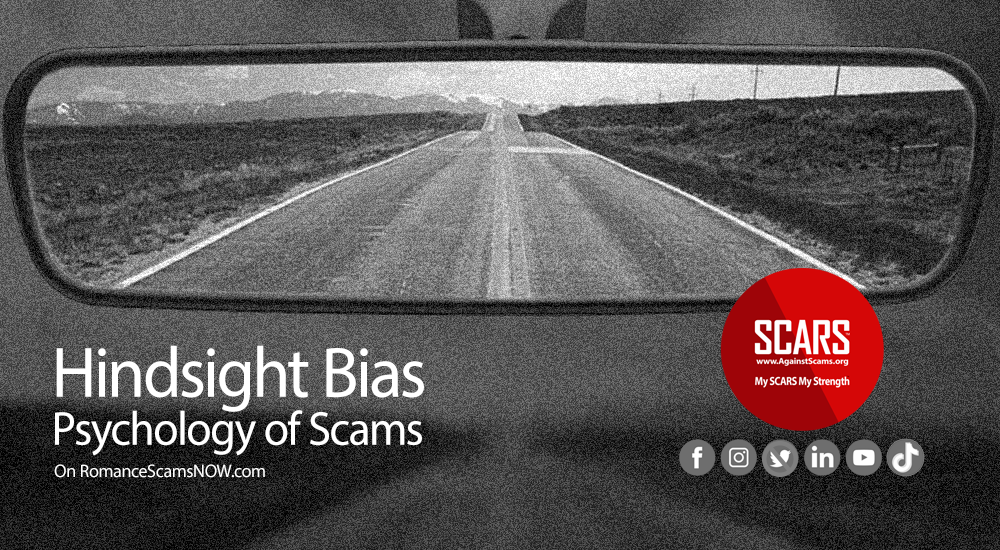
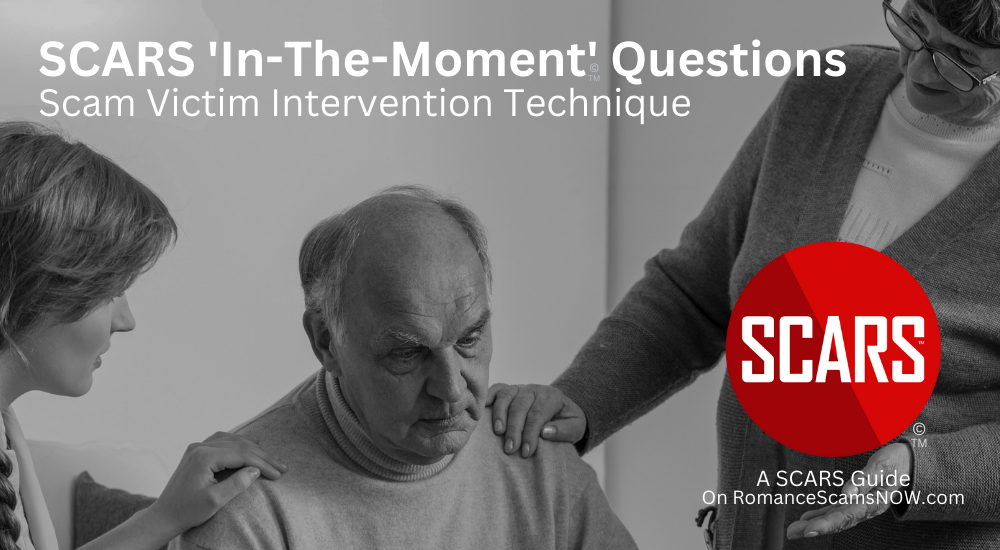











Leave A Comment